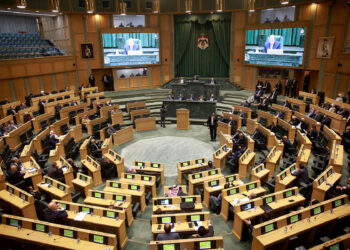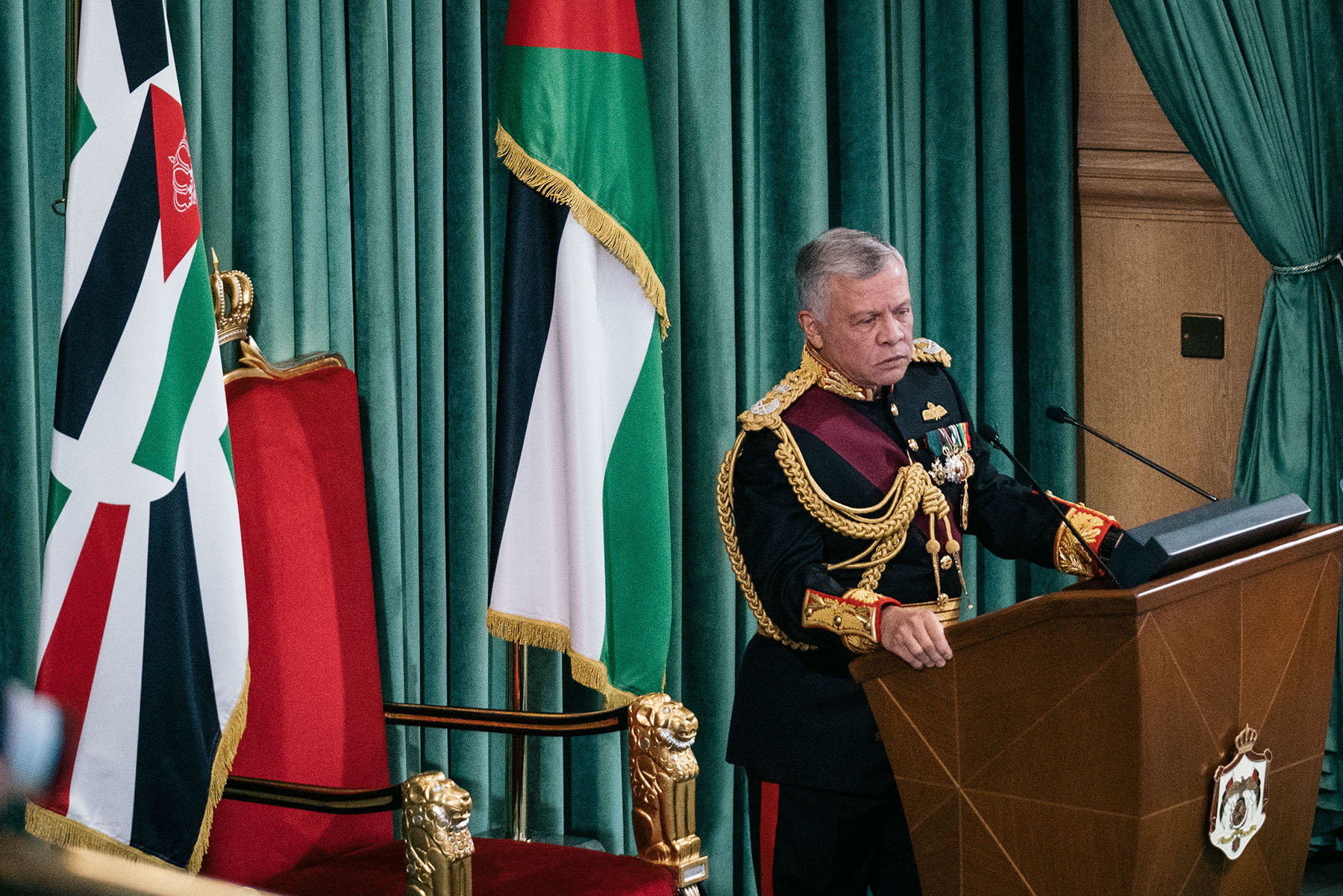*Ahmad Algohbary is a freelance Yemeni journalist who has reported on the Yemen war for international media since war broke out in 2015. His work has appeared in The Guardian and Al Jazeera English, among other outlets. As Co-Director of Photography, Aloghbary filmed the 2018 documentary “Yemen Skies of Terror,” which was nominated for Emmy and Sheffield Awards, and won an online journalism award. Algohbary has also launched a public funding campaign via his Twitter account to provide support for child victims of the war. He tweets at @AhmadAlgohbary.
Bus driver Ali al-Shamhani has had to refuel his bus on the black market in Sanaa for the past six months because of fuel shortages, another byproduct of the Saudi-led war in Yemen that has now entered its eighth year. Fuel on the black market can cost nearly three times as much as gas sold at fuel stations, back when it was available. The acute fuel shortage in Yemen's capital, and across the country, is a result of the crippling blockade by Saudi Arabia and its coalition partners, which has cut off vital supplies and put millions of Yemenis on famine's door. World powers and the United Nations have for years now called for a resolution to end a war that is getting worse by the day. But Yemenis like al-Shamhani, a 43-year-old father of four children, have lost hope in any effort aimed at resolving, or at least easing, what the U.N. has called the world's worst humanitarian crisis. "It never seeks our interests, but rather our destruction," he said, referring to intermittent peace talks brokered by the U.N.
Since the Saudi-led coalition launched its war in Yemen in March 2015, months after Houthi rebels seized control of Sanaa and drove out the government of President Abdrabbuh Mansur Hadi amid the country's civil war, the U.N.'s efforts at bringing the warring parties together have led nowhere. The U.N.'s latest envoy to Yemen, Hans Grundberg, who was appointed last summer, has promised a different approach. "There is a need to use the fact, the beginning of my tenure, to reassess previous attempts and also understand what has worked and what has not worked in making the parties come together for a peaceful resolution," Grundberg told reporters following his first briefing to the U.N. Security Council last September.
A year ago, Saudi Arabia proposed a partial cease-fire of its bombing campaign and an ease on restrictions on the import of goods, in return for a halt to Houthi missile attacks into Saudi Arabia and a Houthi offensive in oil-rich Marib province, east of Sanaa. Marib is the last stronghold of Hadi's Saudi-backed government in northern Yemen, and the Houthi-led forces had made significant gains pushing into the city of Marib last year. The Houthis rejected that offer, asking instead for a complete halt to all coalition airstrikes and an end to the blockade of the port of Hodeideh and Sanaa's international airport, before engaging in direct peace talks, which Saudi Arabia refused. The Houthis have continually suggested that talks about a cease-fire across Yemen should come only after restrictions on Hodeida's port are lifted and Sanaa's airport reopened. The Houthi offensive in Marib, for its part, has threatened thousands of civilians there, according to the U.N., which described Marib as "previously a rare safe haven in Yemen," before the Houthi advance.
"Asking for the blockade to be lifted is the least that Saudi and the UAE can do, and the U.N. should support this given its monumental impact on civilians. Lifting the blockade should be unconditional and immediate, and Yemenis' lives should not be held as bargaining chips."
- Shireen Al-Adeimi
In his first briefing to the U.N. Security Council, Grundberg called on all warring parties to engage in direct talks "without preconditions." He added that "the U.N.'s approach to ending the conflict must be inclusive" and that he would "listen to as many men and women as possible" as he develops a "way forward."
The Houthi-led government in Sanaa, made up of political parties aligned against the Saudi coalition, has viewed Grundberg with growing skepticism. Officials from the government claim the U.N. envoy's briefings have sounded more like Saudi talking points than proposals for genuine peace efforts. "What we ask for and they call conditions are not conditions," Hisham Sharaf, the foreign minister in the Houthi-led government, said in an interview. "They are legal and humanitarian requirements of the people in Yemen." Sharaf served as a minister in multiple Yemeni governments since 2011, including as a minister in Hadi's government from 2012 to 2014.
Shireen Al-Adeimi, an assistant professor of education at Michigan State University who is from Yemen, thinks that while U.N.-sponsored talks are crucial, it's unreasonable to expect the warring parties to not have preconditions. "Asking for the blockade to be lifted is the least that Saudi and the UAE can do, and the U.N. should support this given its monumental impact on civilians," said Al-Adeimi, who has advocated widely against the war. "Lifting the blockade should be unconditional and immediate, and Yemenis' lives should not be held as bargaining chips."
Grundberg's media officer in Sanaa did not respond to media inquiries regarding his efforts at easing the humanitarian crisis and overall engagement with Yemeni negotiators. She instead referred to Grundberg's briefing to the Security Council on March 15. So far, the Houthi-led government has refused to receive Grundberg in Sanaa, citing public outrage over the ongoing Saudi bombing campaign and blockade. Sharaf said that the government in Sanaa wouldn't engage with any proposal by either the Saudis or the U.N. while airstrikes continue and fuel, food and medicine are blockaded. In January, a Saudi airstrike on a prison in Saada, in northwest Yemen, killed at least 87 people and injured some 266, according to Doctors Without Borders.
"Coming to Sanaa without anything new will make the people in our controlled areas feel that we really did nothing for them," Sharaf said of the U.N. envoy. "How could he come while people are suffering from this?" Sharaf said that the Houthi-led government has conveyed its message to Grundberg, but that "some of our ideas haven't been taken into account."
"What we ask for and they call conditions are not conditions. They are legal and humanitarian requirements of the people in Yemen."
- Hisham Sharaf, foreign minister in the Houthi-led government
According to reports in mid-March, the Gulf Cooperation Council, based in Riyadh, considered inviting the Houthis for "consultations" in the Saudi capital, bringing them together with other warring parties in Yemen, including representatives of Hadi's government. The talks were set to start this week and run until April 7. But the Houthis refused the invitation, rejecting the idea that the Saudi government could be an impartial host or negotiator. "Riyadh is a party in the war, not a mediator," Mohammed Ali al-Houthi, the head of the movement's Supreme Revolutionary Committee, said in a statement.
In recent weeks, Grundberg has been meeting different parties to convince them to agree to a truce during the holy month of Ramadan that would begin on April 2. The Houthi's missile attacks on an Aramco oil storage facility in Jeddah on March 25, just miles away from the track of last weekend's Formula One race, may cast doubts on whether such a truce can hold. The Jeddah attack was one of several by the Houthis in recent weeks targeting oil infrastructure in Saudi Arabia. But immediately afterwards, the Houthis declared a unilateral, three-day truce, coinciding with the seventh anniversary of the Saudi intervention, and asked Riyadh to act in kind. While Saudi Arabia hasn't publicly backed it, the truce, for now, appears to be holding for the most part. The Saudis did launch strikes in retaliation for the Jeddah attack, hours after the Houthi announced the truce, but they held off on bombing Sanaa's airport and Hodeidah's port, as they had threatened to do.
In a previous briefing to the Security Council in January, Grundberg glossed over addressing urgent issues like the fuel blockade on Yemen and said he was "focusing on developing a comprehensive, inclusive, multitrack approach," which he has termed the "Framework." On March 7, he began what he called "the first in a series of bilateral consultations with multiple Yemeni stakeholders. The consultations are intended to inform a Framework that would guide a future sustainable settlement to the conflict in Yemen." The meetings he has held so far, though, fall short of being inclusive or sustainable. None of the Yemenis who have taken part in Grundberg's recent workshop in Amman, Jordan are residing in Yemen or representative of the Houthi-led government. On the contrary, they are all Saudi allies who largely live in comfort and luxury paid for by their Saudi patron.
"Peace needs concrete measures to show the people of Yemen everywhere that things are improving, so that we can build peace," Sharaf said, questioning the way Grundberg has convened talks in Amman and who has been invited. "We want a real peace, not a peace paid for by the Saudis and the Emiratis and their collaborators. We want peace for 32 million Yemenis, not [just] for us in Sanaa."
Most Yemeni civilians don't see much sign of the U.N.'s peace efforts, which have done little to ease their suffering. Al-Shamhani, the bus driver in Sanaa, thinks the process is appeasing Saudi Arabia, by endorsing the Saudi coalition's proposals and rejecting "preconditions," like Houthi demands to lift the blockade. He called it a complete surrender to Riyadh's terms, as he worried about rising fuel prices on the black market or if any gas would even be available.































![Security forces loyal to the interim Syrian government stand guard at a checkpoint previously held by supporters of deposed president Bashar al-Assad, in the town of Hmeimim, in the coastal province of Latakia, on March 11, 2025. Syria's new authorities announced on March 10, the end of an operation against loyalists of deposed president Bashar al-Assad, after a war monitor reported more than 1,000 civilians killed in the worst violence since his overthrow. The Syrian Observatory for Human Rights said the overwhelming majority of the 1,068 civilians killed since March 6, were members of the Alawite minority who were executed by the security forces or allied groups. (Photo by OMAR HAJ KADOUR / AFP) / “The erroneous mention[s] appearing in the metadata of this photo by OMAR HAJ KADOUR has been modified in AFP systems in the following manner: [Hmeimim] instead of [Ayn Shiqaq]. Please immediately remove the erroneous mention[s] from all your online services and delete it (them) from your servers. If you have been authorized by AFP to distribute it (them) to third parties, please ensure that the same actions are carried out by them. Failure to promptly comply with these instructions will entail liability on your part for any continued or post notification usage. Therefore we thank you very much for all your attention and prompt action. We are sorry for the inconvenience this notification may cause and remain at your disposal for any further information you may require.”](https://dawnmena.org/wp-content/uploads/2025/04/syria-22039885951-360x180.jpg)






